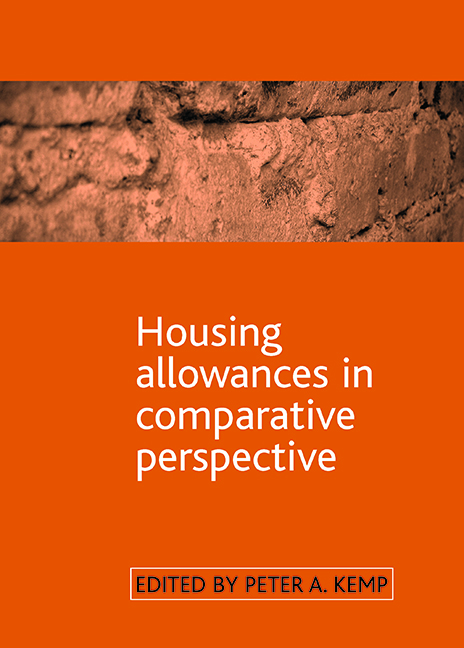Book contents
- Frontmatter
- Contents
- List of tables and figures
- Acknowledgements
- Notes on contributors
- one Housing allowances in context
- two Housing allowances and the restructuring of the Australian welfare state
- three The New Zealand experience of housing allowances
- four Canadian housing allowances
- five Housing allowances American style: the Housing Choice Voucher programme
- six Housing Benefit in Britain: a troubled history and uncertain future
- seven Housing allowances in France
- eight Housing allowances in Germany
- nine Housing allowances in the Netherlands: the struggle for budgetary controllability
- ten Housing allowance systems in Sweden
- eleven Housing allowances in the Czech Republic in comparative perspective
- twelve Housing allowances in the advanced welfare states
- Index
nine - Housing allowances in the Netherlands: the struggle for budgetary controllability
Published online by Cambridge University Press: 15 September 2022
- Frontmatter
- Contents
- List of tables and figures
- Acknowledgements
- Notes on contributors
- one Housing allowances in context
- two Housing allowances and the restructuring of the Australian welfare state
- three The New Zealand experience of housing allowances
- four Canadian housing allowances
- five Housing allowances American style: the Housing Choice Voucher programme
- six Housing Benefit in Britain: a troubled history and uncertain future
- seven Housing allowances in France
- eight Housing allowances in Germany
- nine Housing allowances in the Netherlands: the struggle for budgetary controllability
- ten Housing allowance systems in Sweden
- eleven Housing allowances in the Czech Republic in comparative perspective
- twelve Housing allowances in the advanced welfare states
- Index
Summary
Introduction
After the Second World War, bricks-and-mortar subsidies and rent control were introduced to ensure rented housing remained affordable in the Netherlands. The social rented sector was the main instrument for national government to stimulate housing production and safeguard affordable housing. In recent decades, a gradual shift has taken place from subsidised rents to personal subsidies for households: housing allowances. The shift from subsidised rents towards market-based rental is still ongoing and the housing allowance scheme has developed into the core instrument in Dutch housing policy (about 56% of the national housing budget). This shift did not take place without comment and has given rise to many lively debates.
The central theme in this chapter is: how does the housing allowance scheme operate in the Netherlands, balancing between the goals of affordability and housing quality and the need to control public budgets? The following questions are examined:
• How have housing allowances developed within Dutch housing policy?
• How has the Dutch housing allowance scheme developed since 1975?
• What are the dilemmas in designing the housing allowance scheme?
• What are the future challenges?
The next section deals with the role of housing allowances in Dutch housing policy and sketches how housing allowances captured a prominent place in this policy. The following section discusses the development of housing allowances and the affordability of housing in the period from 1975 to 2002. The chapter then describes a number of problems and the political answers in the Netherlands. The subsequent section outlines developments and current dilemmas and the chapter ends with a number of conclusions and recommendations.
Housing allowances and housing policy
The duty to provide housing is enshrined in the Dutch Constitution. The policy to make housing affordable constitutes an important dimension of this duty. In this section we provide a historical overview of this policy and show that, over time, housing allowances have played a steadily more important role in Dutch housing policy.
After the Second World War, social rented housing was heavily subsidised and financed with government loans. An important reason for this was that the rents had been frozen since 1940 as part of the government's wage policy. As a result of this stringent rent policy, the construction of new houses was not an attractive financial proposition and subsidies were needed to stimulate housing production.
- Type
- Chapter
- Information
- Housing Allowances in Comparative Perspective , pp. 193 - 214Publisher: Bristol University PressPrint publication year: 2007
- 1
- Cited by



